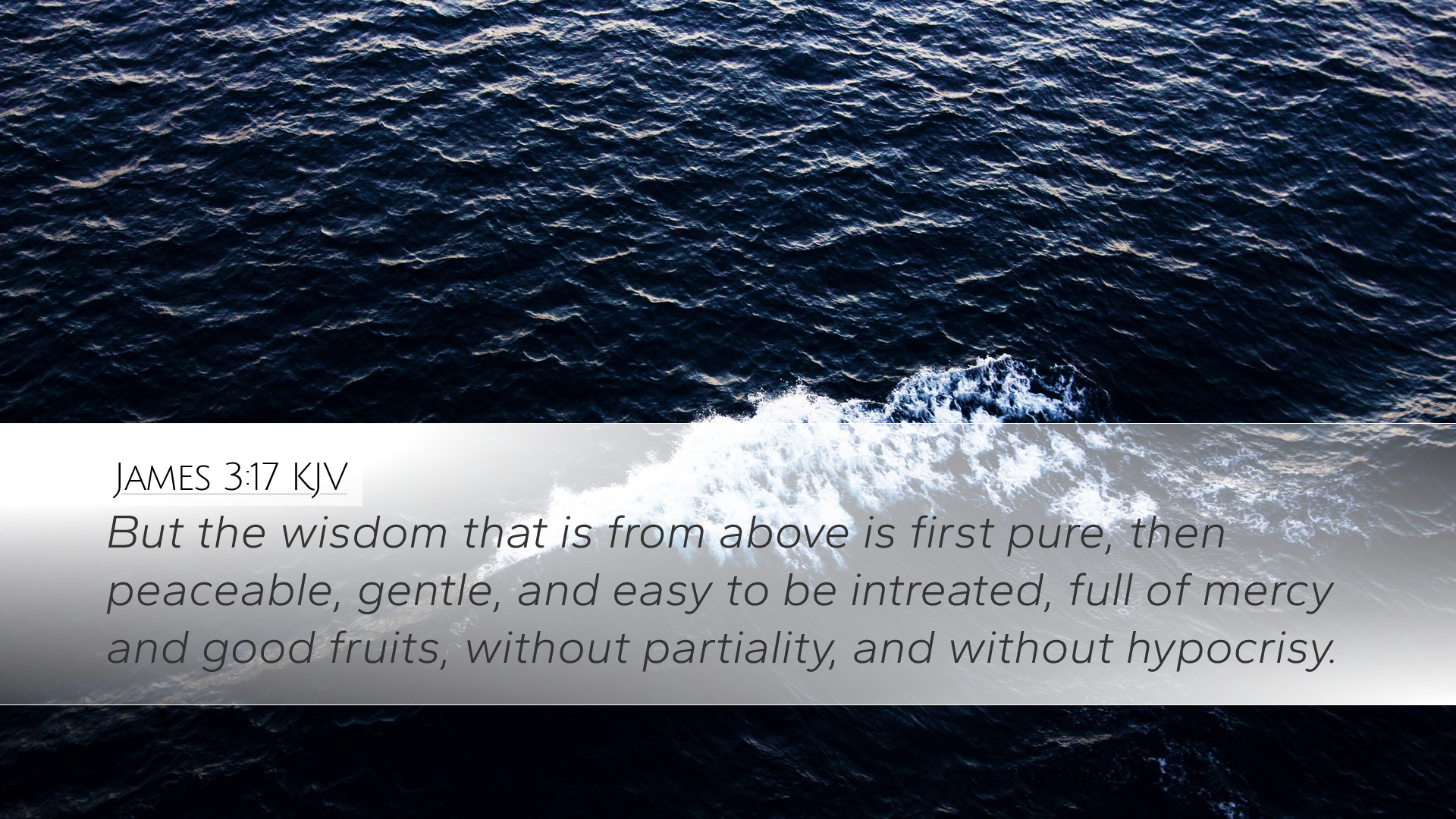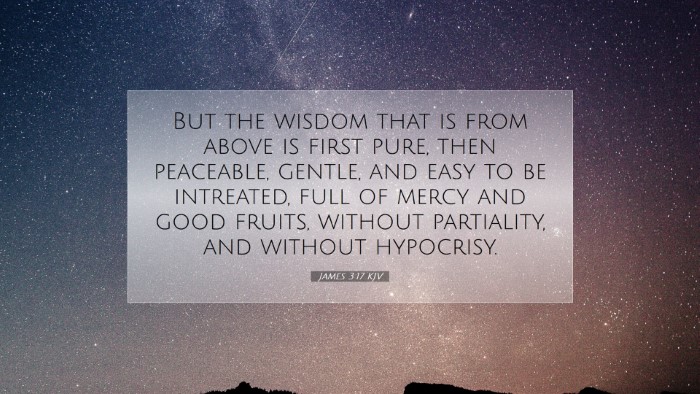Old Testament
Genesis Exodus Leviticus Numbers Deuteronomy Joshua Judges Ruth 1 Samuel 2 Samuel 1 Kings 2 Kings 1 Chronicles 2 Chronicles Ezra Nehemiah Esther Job Psalms Proverbs Ecclesiastes Song of Solomon Isaiah Jeremiah Lamentations Ezekiel Daniel Hosea Joel Amos Obadiah Jonah Micah Nahum Habakkuk Zephaniah Haggai Zechariah MalachiJames 3:17
James 3:17 KJV
But the wisdom that is from above is first pure, then peaceable, gentle, and easy to be intreated, full of mercy and good fruits, without partiality, and without hypocrisy.
James 3:17 Bible Commentary
Commentary on James 3:17
The verse James 3:17 states: "But the wisdom that is from above is first pure, then peaceable, gentle, and willing to yield, full of mercy and good fruits, without partiality and without hypocrisy." This verse encapsulates the nature of divine wisdom and serves as a standard for evaluating the wisdom we encounter in our own lives and in the world.
Divine Wisdom: An Overview
In contrast to earthly wisdom, which is often tainted by selfishness and ambition, the wisdom from above is characterized by its purity and divine origin. Public domain commentaries shed light on various aspects of this verse, emphasizing the implications for both personal conduct and community life.
1. The Purity of Wisdom
Matthew Henry notes that the purity of wisdom signifies untainted motives and intentions. He highlights that true wisdom is not only about knowledge but is underpinned by righteousness. This purity is foundational, with all other characteristics flowing from it.
2. Peaceable Nature
Albert Barnes elaborates on the peacemaking aspect of divine wisdom. Peaceable wisdom seeks to reconcile and foster harmony within the community. Barnes argues that true interaction among believers should exemplify this peace, contrasting it with wisdom that breeds conflict and division.
3. Gentleness and Approachability
Adam Clarke emphasizes the gentleness of wisdom from above. He explains that gentleness is not weakness but rather strength under control. Wisdom ought to engage others with tenderness, presenting truths without harshness or arrogance, thus inviting discourse rather than contention.
4. Willingness to Yield
Further expanding on this idea, Henry discusses the importance of being willing to yield. A wise person does not cling rigidly to their own opinions but shows flexibility in dialogue. This humility reflects a profound understanding of community and the necessity of valuing others’ insights.
5. Full of Mercy and Good Fruits
Barnes notes that wisdom should be abundant in mercy and good fruits, suggesting that wisdom manifests in acts of kindness and compassion. Genuine wisdom inspires actions that uplift and restore rather than demean or diminish.
6. Without Partiality
The mention of partiality speaks to the integrity of wisdom. Clarke asserts that divine wisdom does not discriminate; it sees all individuals as equal in value. This quality is essential for leaders and influencers who must navigate complex social dynamics without prejudice.
7. Without Hypocrisy
Lastly, Henry points out that wisdom devoid of hypocrisy signifies authenticity. True divine wisdom is sincere and honest, presenting a true reflection of one’s character and beliefs.
The Practical Implications
The attributes outlined in James 3:17 set a benchmark for how believers are to seek wisdom in their lives. It serves not only as a guideline for personal conduct but also as a blueprint for cultivating a community that honors God.
1. Personal Reflection and Application
Pastors and leaders are encouraged to evaluate their own leadership styles against these qualities of wisdom. Are the decisions being made pure, peaceable, gentle, and merciful? Regular self-assessment may lead to more fruitful ministry.
2. Community Building
Students and theologians can explore how these attributes affect communal interactions. Embracing these virtues fosters an environment conducive to growth and unity among believers, aligning with Jesus’ teachings of love and fellowship.
3. Educational Frameworks
In theological education, the principles found in this verse encourage the creation of curricula that promote moral and ethical standards rooted in wisdom from above, reinforcing the importance of character development alongside intellectual growth.
Conclusion
As we reflect on James 3:17, we are reminded that divine wisdom is not merely intellectual assent but a transformative quality that shapes our actions, decisions, and interactions. The insights from public domain commentaries enhance our understanding of how to pursue and embody this wisdom in a world that often prioritizes the opposite.


